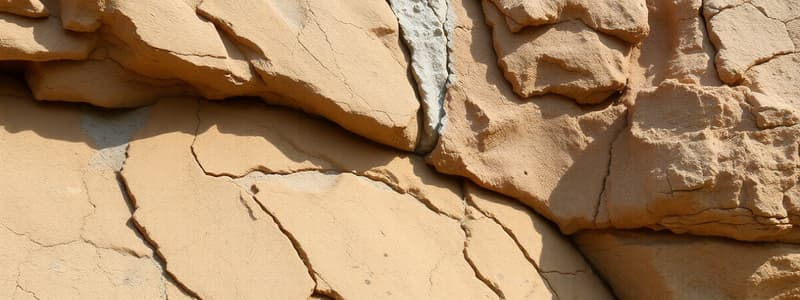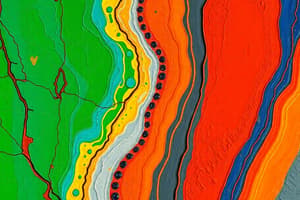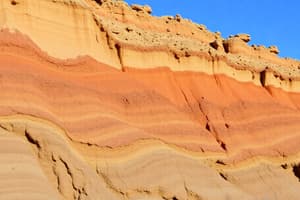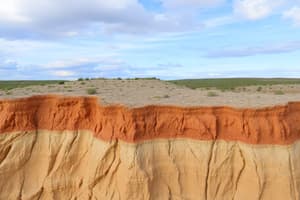Podcast
Questions and Answers
What process transforms bedrock into smaller particles known as sediment?
What process transforms bedrock into smaller particles known as sediment?
- Weathering (correct)
- Deposition
- Erosion
- Sedimentation
Which of the following is NOT a type of mechanical weathering?
Which of the following is NOT a type of mechanical weathering?
- Salt expansion
- Frost wedging
- Oxidation (correct)
- Pressure expansion
Which agent of erosion primarily transports sediment?
Which agent of erosion primarily transports sediment?
- Ice
- Gravity
- Wind
- Liquid water (correct)
What geological features are created by rocks with differing levels of erosion resistance?
What geological features are created by rocks with differing levels of erosion resistance?
What phenomenon occurs when bedrock is rapidly expanded due to a drop in pressure?
What phenomenon occurs when bedrock is rapidly expanded due to a drop in pressure?
What is the primary force behind frost wedging that allows it to break apart rocks?
What is the primary force behind frost wedging that allows it to break apart rocks?
Which term describes roots that have been preserved in the rock record?
Which term describes roots that have been preserved in the rock record?
In which environments is salt expansion most likely to occur?
In which environments is salt expansion most likely to occur?
How do tunneling organisms contribute to weathering processes?
How do tunneling organisms contribute to weathering processes?
What type of weathering involves the expansion of ice in rock cracks?
What type of weathering involves the expansion of ice in rock cracks?
What is the primary cause of tafoni formation in rocks?
What is the primary cause of tafoni formation in rocks?
Which weathering type is most prevalent in warm, humid environments?
Which weathering type is most prevalent in warm, humid environments?
How does surface-area-to-volume ratio influence the rate of weathering?
How does surface-area-to-volume ratio influence the rate of weathering?
What reaction does carbonic acid participate in during chemical weathering?
What reaction does carbonic acid participate in during chemical weathering?
Which statement accurately describes the relationship between mechanical and chemical weathering?
Which statement accurately describes the relationship between mechanical and chemical weathering?
Flashcards
Weathering
Weathering
The process that breaks down bedrock into smaller sediment particles.
Mechanical Weathering
Mechanical Weathering
Physically breaking down bedrock into smaller pieces.
Pressure Expansion
Pressure Expansion
A form of mechanical weathering caused by a sudden drop in pressure as rock is exposed at the surface, causing it to expand and crack.
Erosion
Erosion
Signup and view all the flashcards
Erosion Resistance
Erosion Resistance
Signup and view all the flashcards
Frost Wedging
Frost Wedging
Signup and view all the flashcards
Root Wedging
Root Wedging
Signup and view all the flashcards
Salt Expansion
Salt Expansion
Signup and view all the flashcards
Rhizolith
Rhizolith
Signup and view all the flashcards
Weathering
Weathering
Signup and view all the flashcards
Tafoni
Tafoni
Signup and view all the flashcards
Chemical Weathering
Chemical Weathering
Signup and view all the flashcards
Surface Area to Volume Ratio (SA:V)
Surface Area to Volume Ratio (SA:V)
Signup and view all the flashcards
Carbonic Acid
Carbonic Acid
Signup and view all the flashcards
Hopper Crystal
Hopper Crystal
Signup and view all the flashcards
Study Notes
Weathering and Erosion
- Bedrock is solid rock forming Earth's outer crust
- Weathering breaks bedrock into smaller sediment particles
- Mechanical weathering physically breaks rock (pressure expansion, frost wedging, root wedging, salt expansion)
- Pressure expansion occurs when buried rock surfaces exposed to lower pressure expand and crack
- Frost wedging occurs when water in cracks freezes, expands, and breaks rock
- Root wedging involves plant roots growing into cracks, widening them and breaking rock
- Salt expansion is when salts precipitate and expand within cracks during high evaporation
- Chemical weathering involves chemical reactions changing rock composition (carbonic acid, hydrolysis, dissolution, oxidation)
- Carbonic acid is formed when CO2 dissolves in water, slightly acidic and important for weathering reactions
- Hydrolysis Water molecules replace mineral cations or react directly with minerals to form new molecules
- Dissolution is dissolving minerals in bedrock, leaving ions in solution due to acidic water
- Oxidation occurs when iron in minerals bonds with oxygen, often forming colorful iron oxides (rust)
- Erosion is the process transporting sediment from weathering site via wind, water, ice or gravity
- Surface Area to Volume Ratio is important for weathering, as more surface area exposed means higher weathering rates.
Sedimentary Rocks
- Sedimentary Rocks are categorized as clastic (derived from mechanical weathering) or chemical (precipitated from water).
- Clastic rocks are classified by grain shape, size, and sorting
- Chemical rocks are mainly classified by composition of minerals within rock
Studying That Suits You
Use AI to generate personalized quizzes and flashcards to suit your learning preferences.




